- Serbia
Get to know Serbia
- Citizens
Culture and science
Health services
Pension and disability insurance
- Business
Employment
Economy
- Media
- Government
- Contact
Keep in touch
Contact form
Back
Keepin touch
Whether you have a question, comment, suggestion or any problem in the purview of the government, send us your message and we will try to respond as soon as possible. If your problem is not in our purview, we will forward your message to the relevant institution.
Q:
A:
Law on churches and religious communities adopted
Belgrade,
20 April 2006
Members of the Serbian parliament today adopted the Law on churches and religious communities and amendments to the Law on telecommunications.
With the Law on churches and religious communities, the state offers them cooperation which exists in all European states, but their autonomy and the church's independence from the state is also prescribed by this law.
The law envisages protection of believers from discrimination to which they have been exposed for decades and from political and other abuses. The autonomy of religious schools and faculties which will be equalised with the state ones is also guaranteed by this law, as well as the rights of students which will be the same as in other educational institutions.
The Serbian parliament also adopted the Law amending the Law on telecommunications which enables an equal treatment of all operators and the joining of the fixed and mobile telephony and the Internet into a single system.
In line with these amendments, telecommunication companies will not have to set up separate firms for fixed and mobile telephony and the Internet, but will be able to offer all these services as a single system.
The Law on telecommunications from 2003 envisaged the separation of the mobile and fixed telephony and the Internet into single wholes, but in practice that proved to be unsustainable.
The joining of these three services is a common practice in Europe, and these amendments free the operators from the obligation to re-register their companies.
The amendments adopted also allow for the beginning of privatisation of Mobtel and the performance of the communications activity through the company's departments.
The law envisages protection of believers from discrimination to which they have been exposed for decades and from political and other abuses. The autonomy of religious schools and faculties which will be equalised with the state ones is also guaranteed by this law, as well as the rights of students which will be the same as in other educational institutions.
The Serbian parliament also adopted the Law amending the Law on telecommunications which enables an equal treatment of all operators and the joining of the fixed and mobile telephony and the Internet into a single system.
In line with these amendments, telecommunication companies will not have to set up separate firms for fixed and mobile telephony and the Internet, but will be able to offer all these services as a single system.
The Law on telecommunications from 2003 envisaged the separation of the mobile and fixed telephony and the Internet into single wholes, but in practice that proved to be unsustainable.
The joining of these three services is a common practice in Europe, and these amendments free the operators from the obligation to re-register their companies.
The amendments adopted also allow for the beginning of privatisation of Mobtel and the performance of the communications activity through the company's departments.
-
 Belgrade, 4 January 2026
Belgrade, 4 January 2026Violation of UN Charter has become dominant principle of contemporary politics
-
 Belgrade, 21 December 2025
Belgrade, 21 December 2025Strengthening cooperation with Slovakia in many areas
-
 Belgrade, 21 December 2025
Belgrade, 21 December 2025President of Slovakia ceremonially welcomed in front of Palace of Serbia
-
 Belgrade, 18 December 2025
Belgrade, 18 December 2025Vučić welcomes President of Georgia in front of Palace of Serbia
-
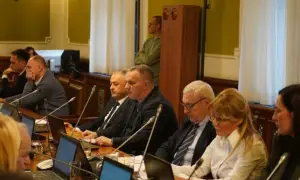 Belgrade, 15 December 2025
Belgrade, 15 December 2025Serbia needs strong, stable education system
-
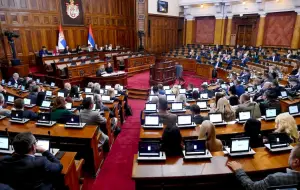 Belgrade, 3 December 2025
Belgrade, 3 December 2025Parliament adopts 2026 budget
-
 Belgrade, 28 November 2025
Belgrade, 28 November 2025Serbian President welcomes President of DR Congo
-
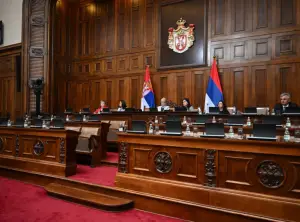 Belgrade, 7 November 2025
Belgrade, 7 November 2025Parliament adopts multiple laws
-
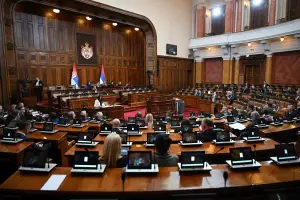 Belgrade, 22 October 2025
Belgrade, 22 October 2025Parliament adopts several laws, ratifies multiple international agreements
-
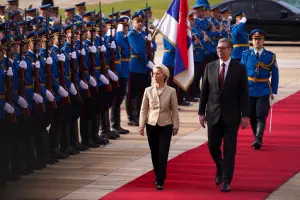 Belgrade, 15 October 2025
Belgrade, 15 October 2025Vučić welcomes Ursula von der Leyen in front of Palace of Serbia
